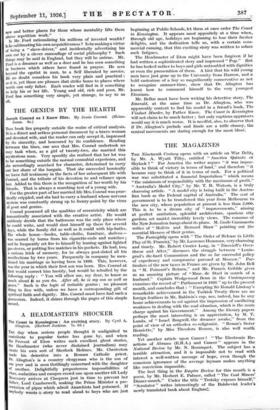A HEADMASTER'S SHOCKER
The Count in Kensington : An exciting story. By Cyril A. Alington. (Herbert Jenkins. 7s. 6d.) THE day when serious people thought it undignified to contribute to popular tastes has gone by, and when the Provost of Eton writes such excellent ghost stories, the Headmaster (who never disdained journalism) may create his own sort of Sherlock Holmes. Mr. Chesterton made his detective into a Roman Catholic priest.
Alington's is a country clergyman who is the son of one peer" and is soon thrillingly concerned with the daughter of another. Delightfully preposterous impossibilities of clues, audacities and escapes crowd one upon another till Lady Rosemary arrives at Chequers just in time to prevent her father, Lord Camberwell, making the Prime Minister a pre- sentation of pipes which adroit Anarchists had poisoned. If anybody wants a story to read aloud to boys who are just
beginning at Public Schools, let them at once order The Count in Kensington. It appears most appositely at a time when, through old age, holidays are beginning to lose their fresher delights, and the dedication tells us, with a certain com- mercial cunning, that this exciting story was written to solace such fatigues.
The Headmaster of Eton might have been forgiven if he had written a sophisticated story and impressed " Pop." But he has looked rather to boys and girls untroubled with dignities or even the premonition of them. A hint that his wild young men have just gone up to the University from Harrow, and a bold caricature of a boy so magnificently conservative as not to recognize summer-time, show that Dr. Alington has learnt how to commend himself to the very youngest Etonian.
Mr. Belloc must have been writing his detective story, The Emerald, at the same time as Dr. Alington, who was apparently content to find his model in a friend's book, The Viaduct Murder, by Father Knox. The Count in Kensington will not claim to be much better ; but only captious appraisers would say it is much worse. It is needful, also, to observe that if Dr. Alington's prelude and finale are a trifle clumsy, the central movements are daring enough for the most blasé.






































 Previous page
Previous page